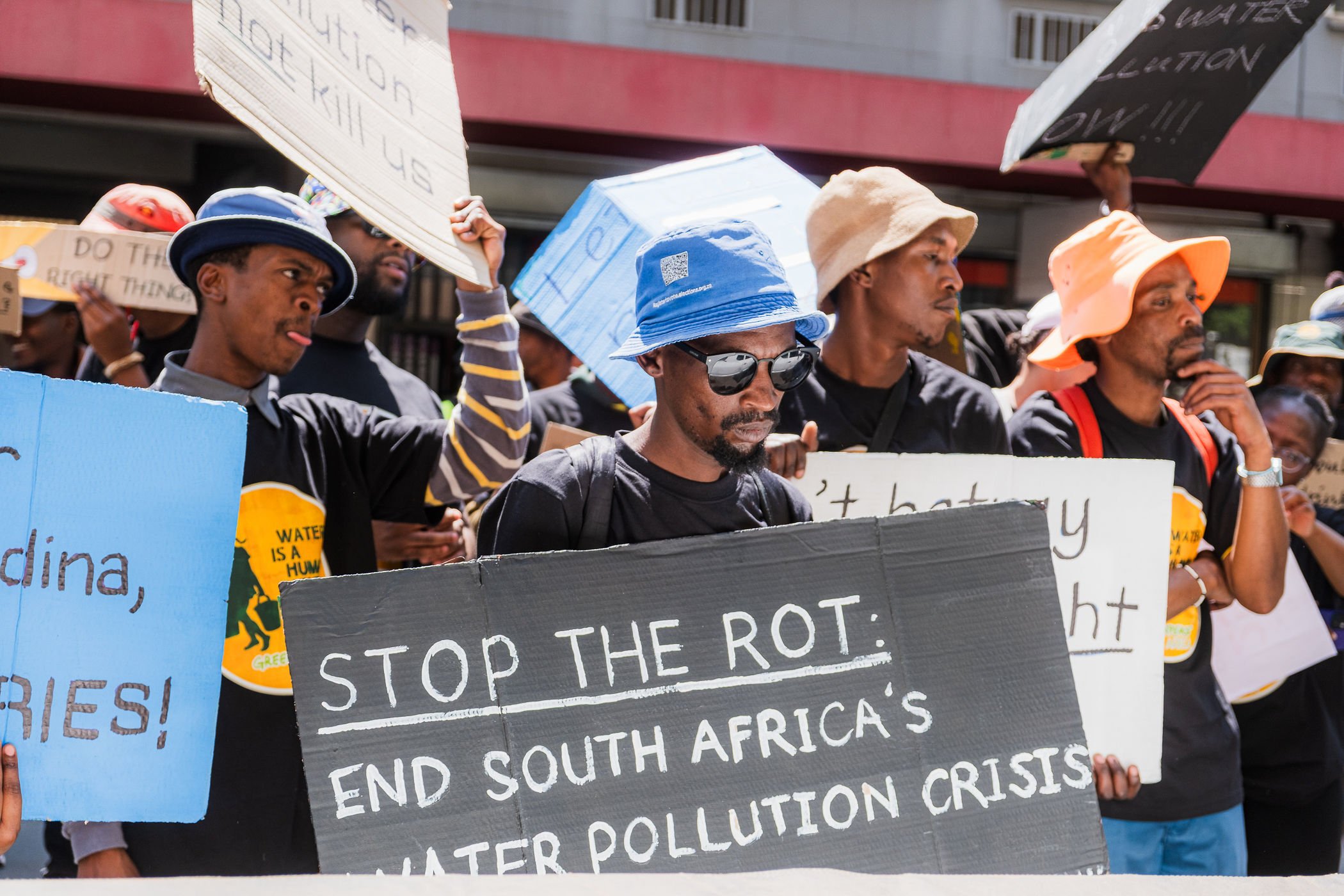11 March 2019, Johannesburg — Today, Greenpeace Africa has released a scientific review[1] of Eskom’s own cost-benefit analysis for its proposed postponement and/or suspension from compliance with the Minimum Emission Standards (MES).
As part of its application for postponements from complying with the MES, Eskom completed a health impact assessment and cost-benefit analysis to support its position that it will cost too much to comply, and that the costs of compliance outweigh the benefits. In order to respond fully to these claims, Greenpeace Africa commissioned Dr Michael Holland and Dr Joseph Spadaro, international experts in the field of health impact assessments of air pollution, to undertake a detailed, independent review of Eskom’s report.
“The review of Eskom’s so-called ‘cost-benefit analysis’ has made it clear that Eskom is intentionally misleading the public and decision-makers by substantially underestimating the health impacts of the utility’s coal-fired power stations in a bid to avoid compliance with relatively weak air quality legislation,” said Melita Steele, Senior Climate and Energy Campaign Manager for Greenpeace Africa.
The review was necessitated by the air pollution crisis in Mpumalanga, the length of time that Eskom has had available in which to prepare to comply, the flawed application, and the thousands of premature deaths that will be caused if Eskom does not comply.
“What has become clear is that the Eskom report draws false conclusions about the benefits of compliance with South Africa’s relatively weak MES. The review finds that the benefits of compliance would be far more significant than the costs[2], which is the opposite of Eskom’s original findings,” continued Steele.
Following the shift in focus of the State Capture Commission onto Eskom, it is undeniably necessary that South Africans are given the honesty that will empower them to deal with the electricity crisis effectively.
“Greenpeace Africa rejects with utter contempt Eskom’s effort to downplay the massive health impacts of their noncompliance with air pollution legislation. Both decision-makers and the public deserve the truth. In the interests of millions of South Africans and our constitutional right to a healthy environment, no further postponements can be given to Eskom’s highly polluting coal-fired power stations,” ended Steele.
Main conclusions of the review[3]:
- The Eskom report is unscientific and intentionally misleads the public and decision-makers. The methodology ignores international practice and substantially underestimates the health impacts of Eskom’s coal-fired power stations.
- The Eskom report draws false conclusions about the benefits of compliance with the MES. Revised estimates by Holland and Spadaro show that estimates of benefits should be greater by a factor of at least 5, leading to an excess of benefits over costs of compliance. This is the opposite of Eskom’s original findings.
Media contact:
Chris Vlavianos, Communications Officer – Greenpeace Africa, [email protected], 079 883 7036
Notes to the editor:
- The full review can be found here.
- The independent review finds that the estimates of the benefits of Eskom’s compliance with the Minimum Emissions Standards should be greater by a factor of at least five.
- What follows below is a summary of some of the report’s most significant findings compiled by Greenpeace Africa:
Key findings of the Review of a Report Providing Health Impact Assessment and Cost-Benefit Analysis (CBA) of Eskom activities by Dr Michael Holland & Dr Joseph Spadaro
On 4 February 2019, Greenpeace Africa submitted detailed comments opposing Eskom’s application for further postponements or suspensions from complying with current air pollution legislation (known as the Minimum Emission Standards, or MES)[4]. Given the air pollution crisis in Mpumalanga, the length of time that Eskom has had available in which to prepare to comply, the flawed application, and the thousands of premature deaths that will be caused if Eskom does not comply, we believe that either Eskom must comply with the relatively weak MES, or it must plan for accelerated decommissioning of some of its coal-fired power stations.
As part of its application, Eskom completed a health impact assessment and cost-benefit analysis to back up its argument that it will cost too much to comply, and that the costs of compliance outweigh the benefits. In order to respond fully to these studies, Greenpeace Africa commissioned Dr Michael Holland and Dr Joseph Spadaro, international experts in the field of health impact assessments of air pollution, to undertake a detailed, independent review of Eskom’s report. The following conclusions have been drawn:
3. The Eskom report is unscientific and intentionally misleads the public and decision-makers. The methodology ignores international practice and substantially underestimates the health impacts of Eskom’s coal-fired power stations.
4. The Eskom report draws false conclusions about the benefits of compliance with the MES. Revised estimates by Holland and Spadaro show that estimates of benefits should be greater by a factor of at least 5, leading to an excess of benefits over costs of compliance. This is the opposite of Eskom’s original findings.
Eskom’s report significantly underestimates the health impacts of its coal-fired power stations. The full report by Holland and Spadaro assesses this in detail under ten subheadings, but outlined below are five key areas in which international research standards have been ignored:
- Emissions data: The report considers four possible scenarios for consideration, and selects one as the most prudent for health impact mediation. However, there is a lack of clear data on change in emissions in all four scenarios, making clear conclusions difficult to draw.
Quote from the report: “No estimates of the change in emissions in the four abatement scenarios considered in the Eskom report have been identified. Without direct access to these data it is not possible to comment whether the assumptions made on abatement are reasonable” (p. 5). - Pollutant modelling/ geographic range: Eskom’s analyses focus on a range of 66km² around the coal-fired power stations. This range does not account for impacts of reactive pollutants, or of effects of small increments in pollution on major cities that are outside the short-range. This cannot be accounted for by a range of 66km².
Quote from the report: “The Eskom report acknowledges that impacts will be experienced outside of the modelled domain, though makes no attempt to quantify the extent to which effects could be underestimated” (p. 6). - Range of impacts considered: The focus of the analysis is limited to mortality. It leaves much to be desired in the consideration of other health impacts, of which there are many.
Quote from the report: “A variety of other impacts have been identified as a result of exposure to ambient air pollution including mortality in childhood, and illness through the life-course. Effects extend to the loss of working days and underperformance at work, leading to direct impacts on business, and time spent at school” (p. 7). - Selection of response functions: In addition to computational errors, the process for selecting the response functions is flawed, and again biases the analysis to underestimation of impacts.
Quote from the report: “The use of the 80% variation seen in outcomes from using response functions for different pollutants is not a sound basis for sensitivity analysis. It simply indicates that some pollutants are more strongly associated with health than others. It does not provide a basis for defining ranges of possible impacts” (p. 10-11). - Mortality rates: Population and disease incidence will not be static over time, as implied by the Eskom analysis. It is anticipated that there will be increases in mortality in the future, reflecting population growth, among other things. Failure to account for this will, again, lead to underestimation of impacts.
Quote from the report: “Future mortality rates should be adjusted for changes in air pollution, population and changes in disease incidence rates, which are not constant” (p. 11).
- Greenpeace Africa’s full submission on Eskom’s application can be found here.




Discussion
Alternative and sustainable energy sources MUST be developed and integrated into the national power grid - we have to come off fossil fuel.